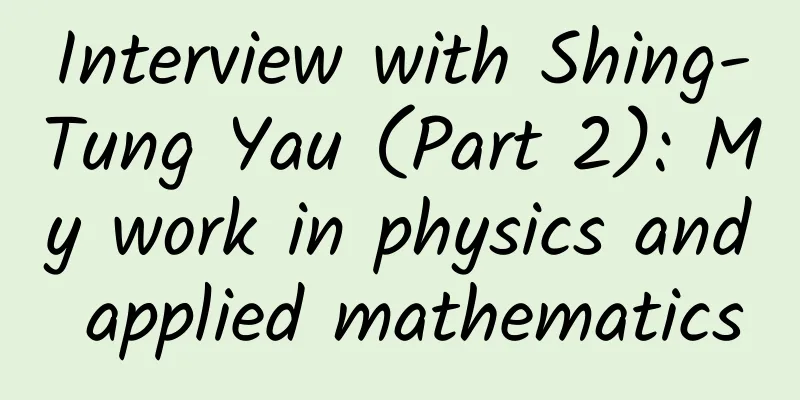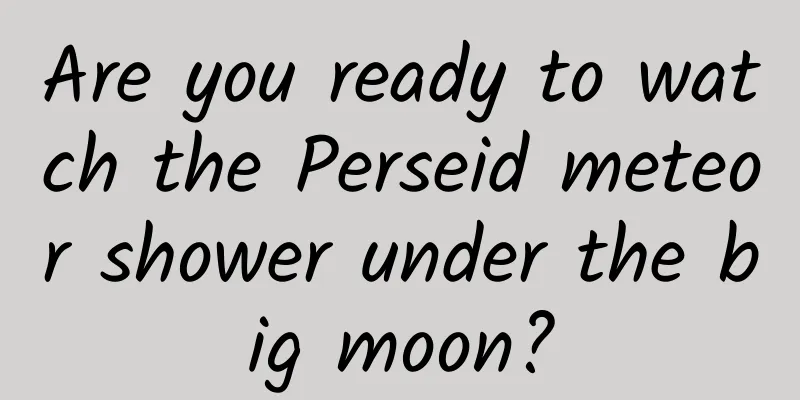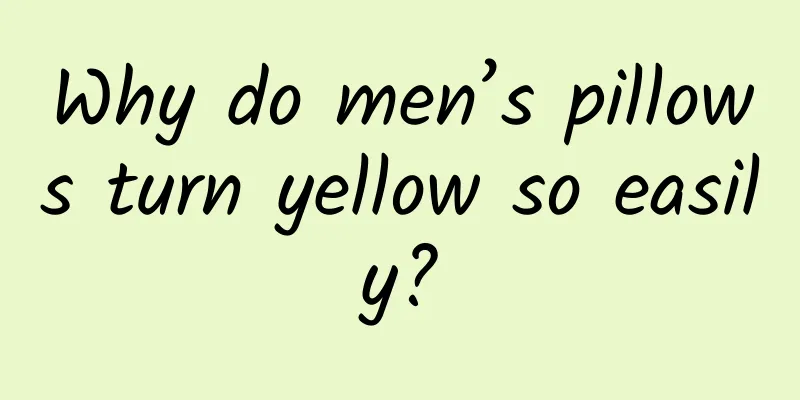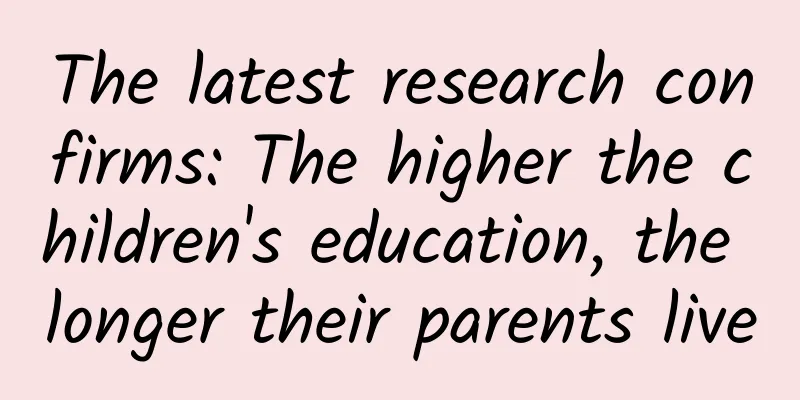Interview with Shing-Tung Yau (Part 2): My work in physics and applied mathematics

|
Earlier this year, Professor Shing-Tung Yau, an internationally renowned mathematician, director of the Center for Mathematical Sciences at Tsinghua University, and dean of the Qiuzhen Academy at Tsinghua University, was a guest at an online live event titled "My Father and I: Talking about Mr. Qiu Zhenying's Lectures on the History of Philosophy" hosted by Tsinghua University Library and CITIC Press. Professor Lou Yuqing of the Department of Physics at Tsinghua University interviewed Mr. Yau during the event. In the first part of the transcript of the interview, "Exclusive Interview with Shing-Tung Yau (Part 1): For the Future of the Nation, We Must Change China's Scientific Culture", Professor Yau talked about how his father, Mr. Zhenying Qiu, passed away when he was only 14 years old, but had a profound impact on his lifelong pursuit of scholarship and teaching, and ultimately influenced his career. He also introduced in detail the concepts, practices and some valuable details of the education of leading mathematical talents that he is striving to promote. In this article, Mr. Qiu introduced some of his important work in physics and applied mathematics to the academic community, and shared some unique views on mathematics and physics. If you have obtained the long-term whitelist reprint authorization of "Fanpu", please apply separately and wait for authorization if you wish to reprint this article. Compiled by Xiaoye and Tan Ying Lou Yuqing: You are a well-known and influential mathematician in the world, but before you left Harvard University, you were also a professor of physics at Harvard. In your opinion, what is the relationship between mathematics and physics? Which of your research works have an impact on physics? How do you envision promoting the development of physics in China, at least the development of theoretical physics? Qiu Chengtong: Mathematics and physics have been inseparable since ancient times. Both mathematics and physics are very important subjects. All great physicists before Newton were related to mathematics. Until the 20th century, people like Maxwell and Lagrange were both physicists and mathematicians. Mathematicians such as Gauss also made contributions to physics. In fact, it is not fair for physicists to sometimes turn the contributions of mathematicians into the contributions of physicists . Many major contributions to physics were made by mathematicians. For example, the special theory of relativity was not made by Einstein alone. Many mathematicians participated in it. Poincare did very important work on the special theory of relativity. There is absolutely no problem with this. But in the early 20th century, because physics began to be less rigorous, especially after the emergence of quantum mechanics, the foundation of quantum mechanics was not only not rigorous in mathematics, but also not rigorous in physics. Of course, many concepts in quantum mechanics are still being argued about, such as quantum entanglement. But in the 1920s and 1930s, quantum mechanics began to become an important discipline that influenced science and achieved many results. So gradually, physicists thought that they were all responsible for it. In fact, mathematicians also participated in the development of quantum mechanics, such as David Hilbert, and later von Neumann. At that time, all the masters were related to quantum mechanics. After the emergence of quantum field theory, the theory became more and more rigorous, so when mathematicians participated, they felt that it was not rigorous enough and spent a lot of time on this aspect. Physics, on the other hand, leapt forward and used experiments to prove that what they did was correct, so it leapt quite fast. After developing to a certain point, physicists thought that what mathematicians did was not important. But in the 1960s and 1970s, they found that their mathematical level was not enough and physics needed a lot of mathematics. Especially after the 1970s, theoretical physicists used a lot of mathematics, which was very important for physics. However, many classical physicists did not understand mathematics and had a lot of criticisms about mathematics because they could not understand other mathematics. In fact, mathematics became the foundation of the entire theoretical physics after the 1970s. Now many important works come from mathematics, so mathematics and physics are actually inseparable. The reason why I have a position in the physics department is that the professors in the physics department voted for me to be a professor. I have several main areas of work. First, I did some important work on general relativity in the 1970s. Now, 50 years have passed, and I am still working on general relativity. Some of my work is still very important. Two years ago (2020), British physicist and mathematician Penrose won the Nobel Prize in Physics. The work of Penrose reported in the media was not completed by him. The final stage was completed by me and a student in 1982. He did the important part in the front, that is, if there is a so-called closed trapped surface in space-time, the singularity of space-time must exist, but he did not know under what circumstances there is a closed trapped surface in space-time. Therefore, he did not complete the singularity problem of black holes. In 1982, my student Richard Schoen and I proved that if the density of matter in a certain area of space-time is greater than a certain critical point, a closed trapped surface will appear, thus generating a black hole. So I also did a lot of work in physics. Second, after the emergence of string theory in physics, my work became their most important tool, or model. This model is still in use today. When people want to test many important physical theories, they still use my model, the Calabi-Yau manifold (Editor's note: see "Yau's work on black holes and string theory"). These occupy a very important position in physics, and I have a lot of contacts with physicists. In addition to this, I also have many other contacts with them. I have been paying close attention to physics since I graduated. Physics has also had a great influence on my work in mathematics. Physicists cannot provide a mathematical proof for the problems that arise in physics. They put forward a point of view, but they are not able to use mathematics to complete it. Many of the views and intuitions they put forward cannot be achieved by mathematicians, and still cannot be achieved. However, some of the questions and views raised by physicists can solve some important old problems in mathematics, and I have also participated in them. Lou Yuqing: You won the Marcel Grossman Award in 2018 (Editor's note: The reason for the award is: in recognition of his great contributions to the positivity of total mass in general relativity, the improvement of the concept of "quasi-local mass", the proof of the "Calabi conjecture" and the research on black hole physics. This is the first time that this physics award has been awarded to a Chinese mathematician). Previously, in 2015, Mr. Tsung-Dao Lee and Mr. Chen-Ning Yang also won this award. Can you briefly introduce your contribution to the study of general relativity? Qiu Chengtong: When Einstein was working on the general theory of relativity, he created an equation and a structure. At that time, an important question was whether it was stable from the perspective of classical general relativity. This is an important question. If the theory is unstable, then there will be a big problem. That is, the so-called collapse of the whole thing, just like the solar system is shaken and the whole solar system disappears. For example, when general relativity describes the collision of two black holes, is the equation describing the entire system stable? What does this stability mean? According to the view of general relativity at that time, first of all, the entire system has an energy. In ordinary physics, the energy is generally positive, but the energy defined by general relativity is an energy defined by Einstein, and it is not known whether this energy is positive or negative. If an energy is negative, it means that the entire system will collapse. If it collapses, it means that the theory of general relativity is wrong, which means that the system is moving towards lower energy and becoming more and more negative. So this problem has been considered since Einstein. It took decades of effort. Physicists were confused about it and wondered if it was possible to solve it. First, Einstein and Hilbert completed the first step of general relativity together. At that time, they were very interested in the energy problem because general relativity is a nonlinear equation, a nonlinear theory, unlike ordinary mechanics which is linear. In addition, it has no symmetry. Ordinary Newtonian mechanics has many symmetries, one of which is translation and the other is rotation, which has conservation quantities, but general relativity does not have this translation and conservation quantity, so it took a lot of effort to define energy. Hilbert and Einstein defined this concept of energy. After defining it, because they did not know whether energy was positive or not, they spent a lot of effort to consider this issue. In the 1950s, many great physicists proposed that we should not assume it is positive first, but assume it is negative first, then is there any way to correct general relativity and make it stable? They put forward many different opinions on this. But by the 1970s, they still had no way to solve it. Later, in 1978, we solved the problem and proved with my student Richard Sun that it is generally positive. We also made very careful estimates of the nonlinear equations and proved that it is positive. So from that time on, we knew that general relativity is stable from the point of view of energy and will not collapse. From this proof, we also found the mechanism of black hole formation. I proved with my students that when too much matter gathers together, it will become a black hole. As for the issue of energy, we are still discussing it today. I proposed many important ideas, which are still being developed. So I have done many different things in general relativity. The Marcel Grossmann Prize is mainly related to general relativity and gravity. Lou Yuqing: How do you view the development of many other important fields of physics today? For example, quantum computers and quantum communications. Of course, we imagine that there may be many challenging mathematical problems involved. How do you view these fields from a macro perspective, and what role mathematics may play in them? Yau: Whether it is quantum computing or quantum communication, I think many problems are that the foundations of quantum mechanics itself have not been understood clearly, so many important problems have not been solved. The basic problems of quantum mechanics itself are more challenging and interesting to me, but in addition to basic problems, quantum computing also has other technical problems, and mathematics plays a very important role in them, but it is not clear what role it plays. I have a friend, Peter Shor, who made the first algorithm for quantum computing in 1994. This is a very important research, and the mathematics he used is not simple. Quantum computing is the application of quantum mechanics, quantum field theory and other mathematics, which I also do, but generally speaking, my research focus is not on these applications. But I also do applied mathematics, and I actually put a lot of effort into it. For example, I have been doing image processing for 30 years. But I don’t take applied mathematics so seriously. I work with my brother (editor’s note: Professor Qiu Chengdong of the Department of Mathematical Sciences at Tsinghua University) on some important problems in control theory. I also work with Gu Xianfeng (editor’s note: currently a tenured professor in the Department of Computer Science at Stony Brook University, State University of New York), a student of Tsinghua University (who graduated and went to study in the United States). He was a doctoral student under my guidance when he was studying. It should have been 1999. I guided him to do image processing, using the so-called conformal transformation. This was done by applying some of Riemann’s ideas. Although the idea was very natural, it was not widely used in computer science at the time. This was developed by me and Gu Xianfeng. Many people are using it now, but they don’t mention the source. In fact, it was started by me. I am still doing applied mathematics. Lou Yuqing: Do you think artificial intelligence can make a big difference in certain types of mathematical fields? For example, it can propose mathematical conjectures based on a large number of case studies, or even go a step further to prove mathematical conjectures? Do you think that in this case, the competition between mathematicians and machines will become more and more intense? Of course, when machines prove something, there will be the question of whether we humans believe that the proof of the machine is correct. Yau: Artificial intelligence is very important for many things, but I don't think it can really make a meaningful conjecture. Because there is a person's joy, anger, sorrow, and happiness, and a person's taste, which cannot be learned by machines. Humans are full of contradictions. Sometimes we like something, and sometimes we don't like it. Some contradictory things can happen and proceed at the same time in people, but machines don't have these. So an article has (the author's) good or bad, which machines can't do. You just mentioned the Riemann hypothesis. After 50 years, I am still not very excited about the Riemann hypothesis, but I am very excited about the Calabi conjecture at first glance. The machine basically relies on inputting human ideas and then looking for something in a pile of data, and it will find it. But the pile of numbers it finds may not reflect the most real situation. A physicist once said that there are many fish in the sea. If you put a net in the sea, and the holes in the net are all one foot in size, then all the fish we see in the world are fish larger than one foot. Is it because our tools hinder our view? Some things cannot be seen by machines. Machines keep generating some things from data, just like we have the ability to think, but machines do not really think, but solve the accumulated facts. However, the facts you see are not complete, and this is far from enough, so the machine cannot move forward. I have talked to my friends who work on artificial intelligence many times, and they have no way to find the simplest five axioms from one or two hundred theorems of Euclidean geometry. Similarly, I think machine learning cannot summarize Newton's three laws by learning all the important problems raised by Newtonian mechanics. Of course, we will discuss this issue again when the machine can do this one day, but now I believe it cannot do it. Lou Yuqing: Previously, AlphaGo Zero played the game of Go and made some achievements that humans have never made before. So do you think similar phenomena will emerge when artificial intelligence is used in mathematics? Qiu Chengtong: I cannot deny that some things are good, but what is produced now (by mainstream artificial intelligence) is an algorithm, not a real theorem. It can find some new methods from very messy things, but it will not summarize a new (higher cognition). It cannot know how important a theorem or law is, and it does not know which one is the most important and can affect other laws. (End) This article is supported by the Science Popularization China Starry Sky Project Produced by: China Association for Science and Technology Department of Science Popularization Producer: China Science and Technology Press Co., Ltd., Beijing Zhongke Xinghe Culture Media Co., Ltd. Special Tips 1. Go to the "Featured Column" at the bottom of the menu of the "Fanpu" WeChat public account to read a series of popular science articles on different topics. 2. Fanpu provides a function to search articles by month. Follow the official account and reply with the four-digit year + month, such as "1903", to get the article index for March 2019, and so on. Copyright statement: Personal forwarding is welcome. Any form of media or organization is not allowed to reprint or excerpt without authorization. For reprint authorization, please contact the backstage of the "Fanpu" WeChat public account. |
<<: Grill meat scientifically and become the coolest guy at the table!
Recommend
Jiangsu’s new regulations on childcare leave in 2022: When will they take effect? Does the 10-day parental leave include weekends?
Recently, Jiangsu Province issued the "Imple...
One action can cause your blood vessels to collapse instantly! Don’t wait until you get hurt to regret it!
This article was reviewed by Fang Jie, Associate ...
Summary of the key points of the full text of the 2022 Government Work Report: There are mainly 26 key points!
At 9:00 a.m. on March 5, 2022, the opening meetin...
Which is healthier: eating a lot and not gaining weight or drinking water and gaining weight?
When it comes to weight loss, people are not crea...
Plague warning! Catching pikas and touching groundhogs, is that a risk to your life?
Summer vacation is here, and more people are trav...
Event Operation: How to achieve high conversion rate through poster copywriting?
Operations staff often come into contact with eve...
How much food can a person eat at one time?
In recent years, news and eating shows about &quo...
Zhihu Institutional Account Operation Manual
Last year, I wrote Zhihu Institutional Account Op...
A Brief Analysis of High-Performance IO Model
A Brief Analysis of High-Performance IO Model Ser...
Flowers bloom in the spring…wait, why do these spring flowers bloom in the winter?
Recently, Forsythia suspensa and Winter Jasmine i...
Bundling wind, solar and thermal power for external transmission? The transformation from transmitting "coal-fired power" to transmitting "green power"
Editor’s Note: Millions of IPs create science pop...
The "Ground Space Station" is here! Do you know the elements that make up the space station?
On February 27, my country's first "spac...
Windows 10 free upgrade! Can piracy be washed away?
At the launch of Windows 10, Microsoft announced ...
How big is the threat of asteroid impact? NASA launched a defense test, and Musk got involved again
On November 24, that is, yesterday, a Falcon 9 ca...
How to use ROI data to increase downloads and purchase conversions?
In the first half, traffic acquisition is used to...









